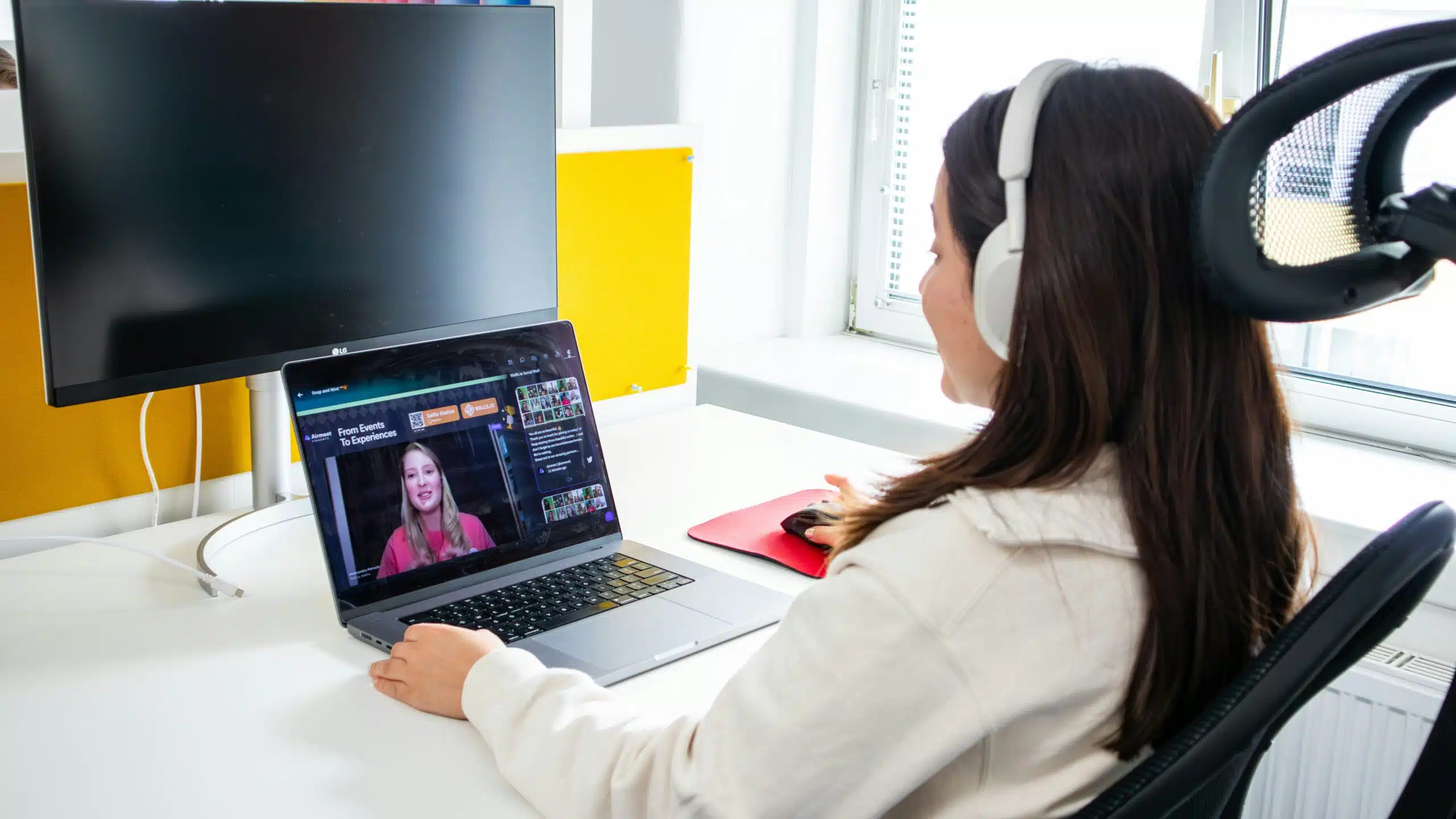How can organizations effectively engage remote employees in corporate events? This article explores strategies to bridge the distance and foster inclusion, such as leveraging technology tools, planning interactive virtual activities, and enabling knowledge sharing among remote teams.
By creating engaging events that connect remote employees, boost morale, and strengthen organizational culture, companies can ensure their remote workforce feels valued and connected, no matter where they are located.
Key Takeaways
- Virtual reality and immersive technologies enhance remote employee engagement in corporate events
- Clear communication and detailed agendas are crucial for successful virtual gatherings
- Interactive elements like polls and Q&A sessions boost participation and foster connection
- Measuring engagement metrics helps organizations improve future remote events
- Team-building activities and recognition programs combat isolation among remote employees
Planning Inclusive and Interactive Virtual Events

Planning inclusive virtual events requires careful consideration of platforms, interactive elements, content design, and accessibility. Effective strategies boost employee confidence and foster a collaborative culture in hybrid work environments.
Event management focuses on choosing appropriate platforms, incorporating engaging elements like polls, tailoring content for remote audiences, and ensuring all participants can access and fully engage in the event.
Choosing the Right Virtual Event Platforms
Selecting the right virtual event platforms is essential for effectively engaging remote employees in corporate events. Platforms with interactive features, such as scavenger hunts, can boost employee participation and foster a relaxed workplace atmosphere, appealing especially to millennials.
Statistics show that engaging in virtual events enhances employee satisfaction and productivity. When choosing a platform, organizations should prioritize user-friendliness, device compatibility, and features that facilitate meaningful interactions among participants, ensuring that the virtual event fosters connection and inclusivity for remote teams.
Incorporating Interactive Elements Like Polls and Q&A
Interactive elements like polls and Q&A sessions play a crucial role in boosting employee motivation and engagement during virtual corporate events. These tools create a sense of involvement, fostering a feeling of connection among remote participants.
By incorporating mentorship opportunities and gamification techniques, organizations can incentivize active participation and create a more dynamic event experience. Polls provide instant feedback, while Q&A sessions allow employees to voice their thoughts and concerns, contributing to a more inclusive and interactive atmosphere.
Designing Engaging Content Tailored for Remote Audiences
Designing engaging content for remote audiences requires a focus on project management and virtual office dynamics. Organizations can boost energy and productivity by incorporating interactive elements like collaborative playlists or virtual team-building exercises.
Content should be tailored to address the unique challenges of remote work, providing practical solutions and fostering a sense of connection among dispersed teams. By leveraging digital tools and creative approaches, companies can create memorable virtual events that resonate with remote employees and enhance their overall work experience.
Ensuring Accessibility for All Participants
Ensuring accessibility for all participants is crucial in virtual corporate events. Human resources departments must consider diverse needs, including those with disabilities or limited technology access. Incorporating regular breaks and team building activities can help maintain employee morale and prevent burnout.
As organizations navigate the challenges of the great resignation, inclusive events that accommodate all employees foster a sense of belonging and engagement, regardless of physical location or individual circumstances.
Leveraging Technology to Bridge the Gap

Technology plays a crucial role in bridging the gap for remote employees in corporate events. This section explores how virtual reality, live streaming, collaboration tools like Microsoft Teams, and social media can enhance engagement.
It also discusses effective icebreakers and exercises to achieve the goal of unifying a dispersed workforce. These strategies aim to create immersive and interactive experiences for remote participants.
Utilizing Virtual Reality for Immersive Experiences
Virtual reality (VR) offers immersive experiences that can effectively engage remote employees in corporate events. Companies can use VR to host virtual yoga sessions for wellness, integrate analytics tools to track engagement and create interactive competitions to boost team spirit and motivation.
Additionally, VR-based learning environments provide interactive training sessions, enhancing skill development and knowledge retention. These innovative approaches help bridge the gap between remote and in-office employees, fostering shared experiences that strengthen team bonds and improve overall engagement.
Implementing Live Streaming and Webinars
Live streaming and webinars are effective tools for engaging remote employees in corporate events, enabling real-time participation and fostering a sense of connection. These technologies allow distributed teams to attend conferences and workshops while interactive features like polls and Q&A sessions boost engagement.
By collecting data from these sessions, organizations can assess employee participation and refine future events. Hybrid events also combine both virtual and in-person experiences, offering inclusive options for all employees, while virtual networking and gamification further enhance the experience.
Encouraging the Use of Collaboration Tools
Organizations can boost remote employee engagement by encouraging the use of collaboration tools during corporate events. These tools create a virtual space where teams can interact, reducing feelings of isolation and absenteeism.
Companies can organize virtual quizzes or hobby-sharing sessions using platforms like Microsoft Teams or Slack, fostering a sense of community while offering employee benefits such as improved work-life balance and increased job satisfaction.
Integrating Social Media for Wider Engagement
Integrating social media into corporate events enhances engagement for remote employees, particularly those from Generation Z who value digital connectivity. Organizations can leverage platforms like Twitter, LinkedIn, and Instagram to create event-specific hashtags, encouraging participants to share their experiences and insights.
This approach fosters critical thinking and collaboration among team members while providing valuable data for employee engagement surveys. Companies may offer a social media participation stipend to incentivize involvement, potentially reducing turnover by creating a more inclusive and connected work environment.
Fostering Community Through Team-Building Activities

Team-building activities foster community among remote employees, enhancing their experience and job satisfaction. Virtual challenges, online workshops, networking opportunities, and achievement recognition promote diversity and reduce micromanagement.
These strategies create a cohesive work environment, boost morale, and offer opportunities for growth and connection, even across distances. Thoughtful gifts can further strengthen team bonds.
Organizing Virtual Team Challenges and Games
Virtual team challenges and games play an essential role in boosting engagement and motivation for remote workers. Companies can utilize intranet platforms to host activities like virtual scavenger hunts, online trivia contests, and digital escape rooms, fostering camaraderie and improving internal communication.
These challenges not only enhance team morale but also encourage collaboration outside regular work tasks. By offering a variety of activities, organizations can cater to different interests and abilities, ensuring inclusivity and making employees feel valued in a remote work environment.
Hosting Online Workshops and Skill-Sharing Sessions
Online workshops and skill-sharing sessions provide an effective way to engage remote employees while fostering problem-solving skills and positive behavior. Organizations can host trivia events or create newsletters featuring employee-led workshops, allowing team members to share their expertise and learn from one another.
These virtual gatherings not only enhance professional development but also strengthen team bonds, creating a sense of community among dispersed workers.
Scheduling Virtual Networking Opportunities
Scheduling virtual networking opportunities is crucial for fostering connections among remote employees across different time zones. Organizations can use platforms like Leapsome to organize structured networking sessions, allowing team members to share skills and experiences.
These events promote autonomy by letting employees choose topics of interest, while also supporting their health and well-being through social interaction. By carefully timing these sessions, companies can ensure maximum participation and engagement, strengthening team bonds and organizational culture.
Recognizing Achievements With Virtual Awards
Recognizing achievements with virtual awards is an effective way to boost remote employee engagement and mental health. Organizations can create virtual escape room challenges that culminate in awards ceremonies, fostering teamwork and problem-solving skills. These events can be designed to fit various budgets and can incorporate coworking elements, allowing employees to collaborate in real-time while working towards a common goal.
By acknowledging individual and team accomplishments in a virtual setting, companies demonstrate their commitment to employee well-being and create a positive work environment that transcends physical boundaries.
Communicating Effectively With Remote Employees

Effective communication is crucial for engaging remote employees in corporate events. This section explores strategies for clear event invitations, detailed agendas, support resources, and open feedback.
These approaches enhance employee loyalty and creativity while fostering a strong remote work culture. By implementing these communication tactics, organizations can boost participation and create meaningful connections across distributed teams.
Sending Clear and Timely Event Invitations
Sending clear and timely event invitations is crucial for engaging remote employees in corporate events. Organizations can leverage mobile apps and desk-based technologies to distribute invitations efficiently, ensuring all team members receive the information regardless of their location.
These invitations should include detailed training and development opportunities available during the event, highlighting the value for remote workers. By utilizing user-friendly technology platforms, companies can streamline the invitation process and track responses, enabling better planning and resource allocation for virtual or hybrid events.
Providing Detailed Agendas and Expectations
Providing detailed agendas and clear expectations is essential for engaging remote employees in virtual events. Clear communication of session goals, timelines, and participation requirements fosters teamwork and a sense of community.
Leaders can boost engagement by outlining specific roles, providing necessary materials, and highlighting opportunities for interaction and collaboration. A well-structured agenda ensures that remote employees are prepared and can participate effectively, enhancing the event’s success. Including breaks and networking periods also helps create a balanced, productive virtual experience for all attendees.
Offering Support and Resources Ahead of Events
Organizations can enhance remote employee engagement by offering comprehensive support and resources ahead of corporate events. Providing a detailed table of contents for event materials, along with clear guidelines for participation, helps establish accountability among remote workers. Companies should also set up feedback channels to address any concerns or questions before the event, ensuring all participants feel prepared and supported.
Encouraging Open Feedback and Discussion
Encouraging open feedback and discussion is essential for engaging remote employees in corporate events. Organizations can implement anonymous suggestion boxes or post-event surveys to gather honest input from participants.
These tools allow remote workers to share their thoughts on the event’s effectiveness, areas for improvement, and ideas for future gatherings. By actively seeking and valuing employee feedback, companies demonstrate their commitment to creating inclusive and engaging experiences for their distributed workforce.
Conclusion
Engaging remote employees in corporate events is crucial for fostering a strong organizational culture and maintaining team cohesion in the digital workplace. By leveraging technology and implementing inclusive strategies, companies can overcome the challenges of distance and create meaningful connections among dispersed teams.
Effective communication, thoughtful planning, and continuous improvement based on data-driven insights are key to ensuring virtual events resonate with remote workers. Prioritizing engaging remote employees in corporate events helps organizations attract and retain top talent, drive innovation, and maintain a competitive edge.


